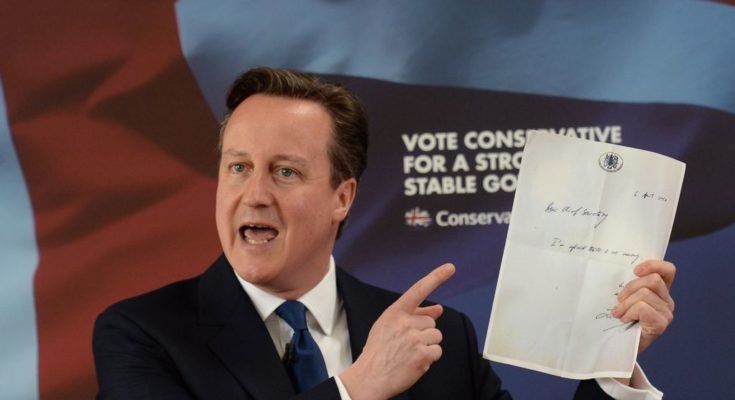It’s All About Me …
David Cameron is facing an election and is currently on the campaign trail across the UK. According to a report in the Guardian, the gaffe-prone Tory leader made the following remark in an inadvertently candid slip of the tongue moment:
“I know I’ve made mistakes. But I’ve learned from them and I promise to do better. But this is a career-defining election …I mean, a country-defining election.â€

David Cameron, the current ruler of the Debtberg Isles, on the campaign trail …
Photo credit:Â Stefan Rousseau / PA Wire
Naturally UK journalists were all over this, essentially saying that it seems as though Cameron “secretly†only thinks about himself. Here’s a newsflash for them: it’s not different with other politicians. A great many politicians are sociopaths. Their profession is simply a natural attractor for the worst people society has to offer. They have to be utterly ruthless, they must be prepared to lie practically all the time, and they are doing all this in order to attain power over their fellow men. Their task is mainly consists of the allocation of loot the State has obtained by coercion. What kind of person could possibly be attracted to such a job?

Cameron bringing nice gifts to welcome Egypt’s brutal military dictatorship to the global community
As Friedrich Hayek noted in The Road to Serfdom, the “worst tend to get on top†in politics. While this was said in the context of totalitarian societies, it is per experience also true in democracies, as the typical “leadership qualities†of politicians who are likely to get on top are very similar: “[…] the unscrupulous and uninhibited are likely to be more successfulâ€Â as Hayek put it. Cameron’s slip of the tongue must be seen in this light. He merely blurted out a truth that applies to almost all leading politicians.

Keep calm and bend over … Steve Bell on David Cameron
Britain’s Economy and Debtberg

Britain has the largest non-financial debt ratio among developed markets ex-Japan – click to enlarge.
Below is a selection of points made in a recent briefing by Deloitte about the UK economy in the context of the upcoming election:
* The UK has seen the policymaker’s dream of accelerating growth and falling inflation over the last 18 months. The long squeeze on UK consumers has drawn to an end: real incomes are rising and the cost of borrowing is very low. On average, economists see the UK growing by 2.5% this year and next, a decent rate of growth which is towards the top of the European growth league.
* There are risks. [no kidding, ed.] US activity data have been on the weak side of expectations since the start of the year. Three months on from the election that swept Syriza to power, Greece’s future in the euro area remains uncertain. At home UK growth came in disappointingly weak in the first quarter, prompting concerns that the UK recovery is running out of steam.
* Concerns about the General Election seem to be behind a decline in corporate risk appetite and rising perceptions of uncertainty in the latest Deloitte survey of Chief Financial Officers. CFOs worry about the risks of higher taxes, more regulation and potential withdrawal from the EU.
* While we think the UK recovery is pretty solid it could yet be derailed. And in the longer term UK faces the challenge of poor productivity and high levels of government borrowing.
* The paradox is that the Coalition missed their deficit reduction targets and the UK deficit, though halved from the levels of five years ago, is still one of the largest in the industrialized world.
* The lesson is that in economics intent matters. Fears about the UK deficit were assuaged by a belief that the Coalition was committed to debt reduction. The euro crisis and a disappointing trend in tax receipts contributed to the failure to meet the deficit target. But markets have remained fairly sanguine, in part because they think the government is serious about deficit-reduction.
* The recovery should not be taken for granted. CFOs’ expectations for investment are already flagging. Given that growth is dependent on the private sector, policymakers need to be acutely sensitive to the effects of their policies on business confidence. Business is nervous about political uncertainty and business-hostile policy change. A strong signal that the new government is committed to pro-growth policies and to stability could help ease such fears.

